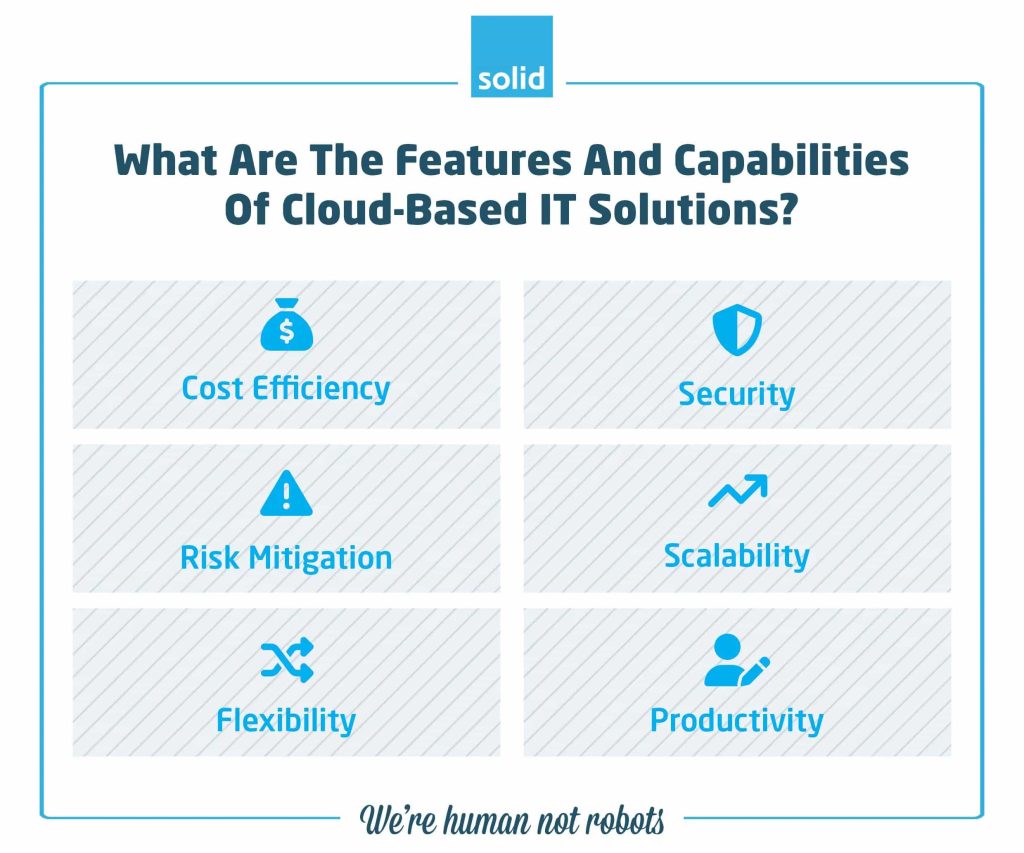
One of the core focuses for many modern businesses is being agile. The world around us is changing rapidly, and being driven by technological innovation. To keep your company and services relevant and meet shifting market demands, you need to be flexible. You need to be able to quickly and effectively adopt new technologies, integrate them into your workflows, adapt to new scenarios, and stay as productive as possible while you’re at it. It’s a big ask. And to accomplish all of this, you need IT solutions that are as flexible and adaptable as your business. You need cloud-based solutions.
What Is Cloud Computing And What Is A Cloud-Based IT Solution?
To answer the question of ‘what is cloud computing’, you need to understand what a cloud-based IT solution is and ask ‘what does it mean to be cloud-based as a business’.
A cloud-based solution is a service, piece of software, or app that isn’t based on-premises in your offices, but is accessible from anywhere in the world, on any device. The solutions are stored on infrastructure within data centres which are managed and maintained by cloud service providers, reducing the maintenance demands on your business, and providing the peace of mind that you need to focus your efforts on furthering your business and meeting shifting demands to exceed your goals.
Cloud computing, or running a cloud-based business effectively, means not only using cloud services, but maximising their effectiveness throughout your operations and your processes.
Why Are Businesses Investing In Cloud IT Solutions?
The rise of cloud-based solutions has come from businesses around the world seeing the advantages that they can offer in terms of flexibility, accessibility, and affordability. The world around us is changing quickly, and SMEs and startups in particular don’t have the kind of capital that would have been needed in the past to invest in on-premises servers and backup solutions, nor do they necessarily want on-premises solutions, given the fact that they need their IT to be available from anywhere in the world at any time for it to truly be effective. Because cloud-based solutions are flexible enough to be adjusted according to a business’ immediate demands, can be scaled to meet any business’ requirements all at a fixed monthly rate, and because they remain accessible without compromising on a company’s security, they have been rising in popularity over the past two decades.
What Are Some Cloud-Based Software Solutions That Could Benefit Your Business?
Cloud-based solutions are not a new concept. Businesses have been taking advantage of them for years, and companies like Microsoft have been developing their offerings to embrace and incorporate cloud services for over a decade. What this means for your business is that there are plenty of well-established cloud-based software solutions that you could be taking advantage of. Here is a guide to cloud based IT solutions that your business could be investing in:
• Cloud Storage
Storing your files, images and data in the cloud makes perfect sense for businesses with remote and hybrid teams, since these cloud storage facilities make it easy for your humans to access the files that they need, whether they are in office or working from their homes. Even businesses with offices in multiple locations will quickly see the advantage of having their teams in Cape Town, Johannesburg, London and LA all being able to access the same files at the same time, and work on them together without any lag or delay. But that doesn’t mean that those working from a single office can’t find an advantage in cloud storage. It optimises accessibility and makes it easy to collaborate on files together from different devices whether they are in the same room, the same city, or worlds apart, and provides the best possible security for those files, since cloud infrastructure is more easily and regularly maintained and updated.
You don’t have to look very far for the right cloud-based solution for your storage. Microsoft has three main cloud storage solutions available that meet varying business needs:
1. SharePoint
Ideal for collaboration, Microsoft SharePoint offers businesses the perfect platform for storing files and documents that need to be accessed regularly by multiple people, and worked on together in real-time. Accessed can be managed easily and effectively, with the option to assign permissions to groups of people, making it simple to add and remove access with the click of a button, without compromising your data’s security. Plus the platform integrates directly with Microsoft Teams, providing a cohesive experience for sharing and collaboration as well as secure storage.
2. OneDrive
Where SharePoint focuses in on teamwork and collaboration, OneDrive is more suited to personal storage. It provides a space for uploading personal files, photographs, data and more, and does include the functionality to share these uploads with others, but to a lesser extent than SharePoint allows for. What OneDrive is perfect for is working on your own drafts of documents before they’re ready to be shared, or storing files and photos that you don’t want to lose from your own PC, but don’t need to share with your colleagues. If you’re looking for a cloud storage platform for your own personal convenience Microsoft OneDrive is ideal. If you need collaboration and easy access for multiple people, then SharePoint is the way to go.
3. Azure Storage
Azure Storage comes in many different forms to suit a variety of storage needs. There’s Hot, Cool, Archive and Blob storage, and you may need a combination of any or all of them, depending on what you need to store, how often you need to access the files, and what your budget is. Hot storage is great for data that needs to be readily accessible, but it comes at a premium price. Archive storage comes at the lowest cost per GB stored, but is intended for files that are being stored for mostly logistical reasons – in case of a SARS audit, for example, where you don’t need to access the data at all until you suddenly find yourself needing to provide three years of back-data. Cool and Blob storage fit somewhere in between the highly accessible and lowest price-point options. Blob storage is particularly useful for unorganised data, from your website for example, where information is not being kept in files and folders, necessarily.
• Cloud Hosting
Where cloud storage is about keeping your data easily accessible in the cloud, cloud hosting is more focused on infrastructure. Cloud-based solutions like Azure Virtual Machines provide you with components like hard drive space, memory and processing power, allowing you to run entire machines, environments, servers, apps and more directly from your computer, but without the need to store or maintain them on-premises. The best part is that because they are not using your devices directly, you are able to run programs and make changes without them impacting your existing hardware and processes. If you find yourself needing more processing power or memory during a busy time of the month or year, you can upgrade your cloud hosting facilities instantly, and downgrade them again as and when your needs change. And Azure isn’t the only cloud hosting service available, either. At Solid Systems, we offer both Azure and our own cloud hosting solutions, managed and maintained by us directly and provisioned in data centres around South Africa and the world.
• Cloud Backup
So many people are still under the impression that cloud storage and cloud backup are one and the same. But the truth is that even when you’re accessing your files in the cloud, it doesn’t mean that they are entirely invulnerable to cyberattacks, human error, or natural disasters like fire and power surges. Don’t get me wrong, cloud storage is an incredibly secure platform, but cybercriminals are using increasingly sophisticated methods like social engineering to gain access to credentials that will allow them to infiltrate your storage, in the cloud and outside of it. To effectively protect yourself against all forms of disaster, including your humans making mistakes or intentionally sabotaging your business, you should be keeping a backup of your data which can quickly and easily be restored if something were to happen to your primary data source.
What Are The Features And Capabilities Of Cloud-Based IT Solutions That You Could Be Taking Advantage Of?

I’ve already mentioned a few of the benefits that are seeing companies embracing cloud-based solutions, but let’s take a deep dive into the advantages that cloud services can offer to companies that embrace them:
• Cost Efficiency
Cloud-based IT solutions do not require extensive setup fees, making them easy and affordable for businesses to adopt. Unlike on-premises solutions, you are not needing to purchase infrastructure straight off the bat, and there are no down-payments required. You can find the cloud-based solution that fits your budget and meets your business needs and pay for them on a month-to-month basis. And when you find your needs changing – whether it’s hiring new employees who need to access your cloud services, or requiring more storage or processing power – you can upgrade or downgrade your cloud-based solution, add or remove licenses and more, all without needing to buy additional hardware to meet those requirements. This makes it far easier to manage your IT budget effectively.
• Security
Your infrastructure is only as secure as the maintenance you’re able to do on it. On-premises infrastructure can be difficult and time-consuming to maintain, often requiring a full IT team to manage it effectively. But when you are using cloud-based IT solutions, this maintenance is a lot easier to manage, since it can be effected from anywhere without you needing someone to physically be in the same space as the infrastructure. On top of this, cloud service providers have access to top-end security software, which you are able to take advantage of. This kind of software can be prohibitively expensive if you are trying to implement it on your own infrastructure with your own budget, which means that SMEs often can’t afford to take advantage of it. But when you are using cloud services, it comes as part and parcel of the cloud services that you are paying for monthly.
• Risk Mitigation
As a business, there is risk involved in everything that you do. When it comes to your IT, there are adoption risks, security risks, the risk of investing your money in the wrong solutions or not getting maximum ROI. Any risk that you are able to mitigate or delegate is a huge weight off your mind, allowing you to refocus your efforts where they will matter most. Because cloud-based solutions are easy to adopt and adjust, are simple to access and use, and are affordable, many of the risks associated with implementing them into your technology stack are minimised if not entirely mitigated. And when it comes to their maintenance and security, cloud service providers take on the majority of the risk themselves, allowing you to delegate that risk and reduce the strain on your internal or outsourced IT teams.
• Scalability
Every business has busy periods where they need more resources. Maybe it’s the end of the tax year and you are needing to store more data than you normally would. Maybe you are busy developing a new product and need to run deeper analysis requiring more processing power than you would normally need. Perhaps you’re running a Black Friday sale and are getting far more traffic to your website than you normally would, or are processing more orders than you are used to, and need to be able to handle that additional load without your systems falling over. If your systems were based on-premises, you’d need to invest in additional hardware to see you through those periods of increased activity. They would be permanent enhancements for your infrastructure, but would be wasted in the other 11 months of the year when they aren’t required. You would essentially be spending a lot of money to make sure that your systems are able to handle those brief periods when your requirements increase. But if you’re using cloud services, there’s no need to invest in additional resources for the months that you don’t need them. It’s easy to upgrade and downgrade your services as and when you need the extra capacity, and downgrade them to more affordable solutions when you don’t. This once again helps you to spend your IT budget in the right areas and plan for the future, without breaking your budget during the months when your needs aren’t as high.
• Flexibility
Having the scalability to upgrade and downgrade your services is extremely useful, but cloud services also offer you the flexibility that you need to make operational changes within your business without it impacting your existing processes. If you’re wanting to shift your environment, provision a Linux server instead of a Microsoft one, want to test applications or try out new software all without the risk of the changes bringing your business to a grinding halt if something goes wrong is gets misconfigured, your cloud-based solutions provide you with the flexibility to do exactly that. This is, once again, part of the agility that cloud services can offer to your company, helping you to shift and change the way you operate, without the risk involved in making those changes on a live environment.
• Productivity
I cannot stress enough the importance of providing your teams with the tools they need to work as productively and efficiently as possible. Every second that your humans are spending searching for documents, struggling with access and permissions, or switching between apps and software, is time wasted. Providing your teams with cloud services which make it easy for them to access the tools and the data that they need to work effectively will see them achieving more for your business, will result in less frustration and a happier workforce that is working together to help you reach your goals.
Why Do You Need A Partner Like Solid Systems?
At Solid Systems, we have been helping companies to put the right cloud-based solutions to use for their operations for over 20 years. We have built up teams of highly skilled and experienced IT professionals whose focus is in the cloud, understanding cloud services and optimising them for the businesses that work with us.
Whether you’re just starting your cloud migration journey and are looking for strategic cloud consulting services, are already taking advantage of cloud-based solutions and are looking for a provider who can help you do more with them, or are wanting to increase the adoption of cloud solutions within your business and see your humans becoming more productive and working smarter, not harder, we are the cloud provider that you need to enhance your operations and see your business stepping into the future with confidence.
Want to see the difference that SOLID can make for your business? Schedule a free consultation today, and help us learn more about your unique needs.
Frequently Asked Questions (FAQs)
There are plenty of cloud-based solutions out there that businesses can take advantage of. These include cloud storage solutions like SharePoint, OneDrive and Azure Storage, cloud hosting solutions, and cloud backup and recovery solutions.
A cloud-based IT solution is a service, piece of software, or app that isn’t based on-premises in your offices, but is accessible from anywhere in the world, on any device. The solutions are stored on infrastructure within data centres which are managed and maintained by cloud service providers, reducing the maintenance demands on your business, and providing the peace of mind that you need to focus your efforts on furthering your business and meeting shifting demands to exceed your goals.
Cloud service providers like Microsoft or, on a smaller scale, Solid Systems, maintain and provision infrastructure within data centres around the world. They then ‘rent’ out the infrastructure, or part of it if you’re using a public cloud service, to businesses that need them. You tell the provider what you need in terms of storage space, CPU, memory and more, and they make that accessible to your business for a fixed monthly rate. You are then able to access these cloud based solutions from any machine, anywhere in the world, either through installable software, or simply through your web browser.
Popular Searches
- Future Of Cloud Computing
- What Exactly Is SharePoint?
- Microsoft SharePoint Vs OneDrive
- Components Of Cloud Infrastructure
- Benefits Of Cloud Computing
- Different Types of Cloud Storage
- Cloud Storage vs Cloud Backup
- Cloud Hosting Service
- Cloud Computing Myth
- Managing Data with Azure Storage
- IT Infrastructure with Cloud Computing





